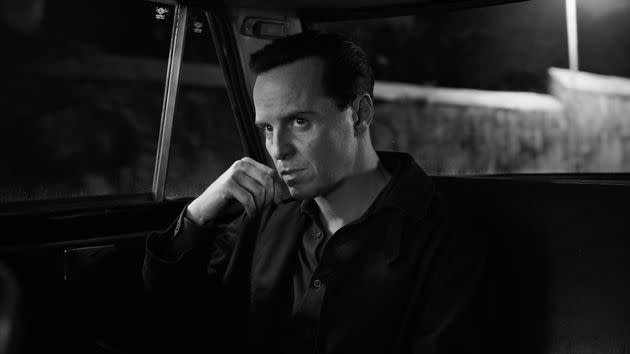What 'Ripley' Understands About Infiltrating The Rich

In today’s climate, where billionaires are swallowing media companies whole, it seems like every fictional TV or movie plot even marginally concerning wealthy characters must confront a number of familiar questions. Do the have-nots “eat the rich”? Does the story effectively make the audience want to condemn the wealthy or affluence in general?
And more broadly: What does it say about capitalism?
To be fair, filmmakers have baited responses like these lately with half-baked ideas about them in films like “Glass Onion” and the even more lacking “Saltburn.”
Netflix’s new series, “Ripley,” however, refuses to engage with any of this — to its benefit. Based on Patricia Highsmith’s popular novels following the escapades of grifter Tom Ripley, a character made cinematically famous in director Anthony Minghella’s terrific 1999 film, “The Talented Mr. Ripley,” “Ripley” finds its protagonist just as calculating, unassuming and murderous as ever.
When we meet him at the start of his eight-episode journey, it’s the 1960s and Tom (absorbingly portrayed by Andrew Scott) is living in New York and getting by well enough on anonymous petty crimes. It’s clear he’s a loner — maybe by choice, due to his lifestyle, or maybe because he just likes it better that way. The audience never really knows for sure, and it doesn’t matter.

Each episode is sumptuous, shot with Robert Elswit’s crisp, black-and-white cinematography. Writer-director Steven Zaillian banks on the audience’s willingness to accompany Tom on the basis of his undeniable intrigue and his slick narrative.
He has the right assumption. It’s virtually impossible to not be fascinated by Tom’s every move, even for those of us who have already seen his trajectory play out before and still love Matt Damon’s performance in the 1999 film. “Ripley” doesn’t much expand on a story that’s already familiar to some. Rather, it takes its time mounting the character’s infiltration into the world of privilege.
A wealthy man’s offer too great to turn down comes along Tom’s path, sending the grifter out of The Big Apple to Italy to find the man’s son (Johnny Flynn) who has retreated there for, perhaps, fun or good vibes — or, really, just because he can. That’s part of the allure of being rich: traversing life on a whim. It’s already beguiling to watch as a viewer, but downright irresistible for a man like Tom.
Because as a con man, Tom can be anywhere, or anyone, at his own will, and no one can really do a thing about that. Few who aren’t rich could say the same.
Like Jacob Elordi’s Felix in “Saltburn,” Dickie is likable; he loves his girlfriend, Marge (Dakota Fanning), feels inspired by his paintings and is thrilled by his adoptive Italian life filled with great food, wine, beaches and friends like Freddie Miles (a phenomenal Eliot Sumner).

One thing “Ripley” smartly seems to recognize about our endless fixation with wealth, on- and offscreen, is that it’s not affluent people or affluence per se that are inherently bad. The show doesn’t actively try to vilify either of them. Instead, it gets to what’s both rotten and enticing about having money: getting to act with impunity.
Rich people can and often do get away with everything, and that’s just the identity Tom needs. Dickie welcomes Tom into his lavish world, in which Tom is quick to partake — decadent dinners, gorgeous landscapes and a frothy lifestyle to boot. But the grifter is more invested in all this because here he can be anonymous and unaffected.
We never witness Tom’s enthusiasm for these endless soirees or spending obscene amounts of money on things that don’t matter. What we see is a man who will do anything to be everywhere and nowhere at once, even if he has to discard or even become other people along the way. It’s sociopathic, cunning as all get out and entirely effective.
It makes every encounter Tom shares with any character — whether the jittery landlady, overly familiar hotel clerks, Marge, a dogged inspector or the snobby Freddie — feel almost instantly perilous. Because potential intimate exchanges are the enemy of the exempt. They make the guilty more vulnerable. But they make for excellent suspense throughout the series.

All of this makes it hard not to think about the role race plays in this story. “Ripley” never contends with it. That could be partly due to the fact that it has an almost completely white cast or because the story, or Zailian, has no interest in it.
But it’s hard not to see this story through the context of a white American man with modest means who is jettisoned across the world because his race, in part, grants him an unbridled trustworthiness to find a man he doesn’t know, who may or may not already be in trouble. (Dickie’s father seems unsure about that last point.)
The one non-white character who might be able to pierce through that layer of racial privilege is played by Bokeem Woodbine, a Black man who bookends the series and is just as mysterious as Tom. Their dynamic together provokes a number of interesting thoughts: like, what does being mysterious, or Woodbine’s character’s relationships with the wealthy, or even wealth itself, grant him?
That would likely be something different than the impunity it ultimately gives Tom. It’s an oversight that becomes a nagging flaw of “Ripley.” Or perhaps it’s folded into one of the great intrigues of a show that effortlessly rails against “eating the rich” and binary morality. The series actively sits in its own shaded reality, much like the wealthy themselves.
“Ripley” drops on Netflix Thursday.

